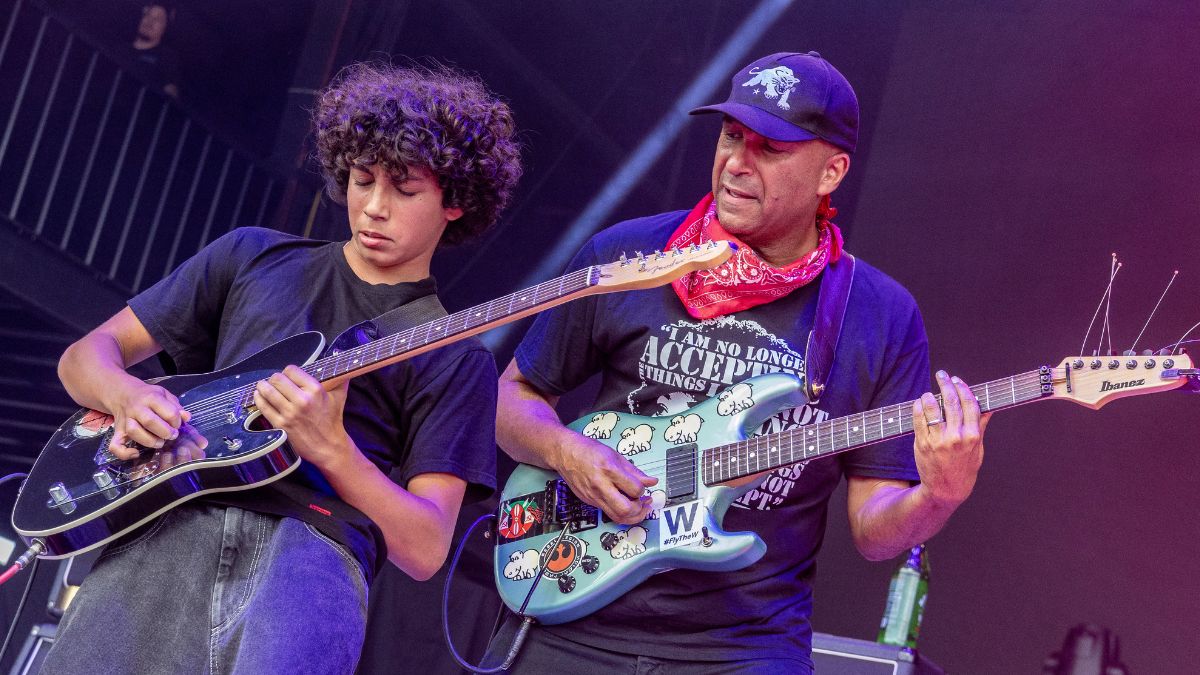“All the pedals should be put in a big pile and we should light ’em on fire”: Mac DeMarco is synonymous with woozy vibrato guitar – but he hates pedals
The hugely prolific singer-songwriter dubs pedals “cheap pieces of s**t with crappy electronics” – and don’t even mention patch cables or power supplies…

Mac DeMarco is one of the humble vibrato effect’s most famous advocates. His early albums, 2 and Salad Days, brought the woozy, seasick sound back to indie rock – so much so that he is practically synonymous with warble, relying on TC Electronic Shaker and Boss VB-2 pedals to deliver his trademark sound on live stages. Yet in a new interview, the maverick Canadian singer-songwriter has revealed he really, really doesn’t like pedals.
“I was just talking to my sound guy. I was sitting around the table outside and I was telling him how much I hate guitar pedals,” DeMarco told Music Tech.
“They’re stupid. They’re cheap pieces of shit with crappy electronics. It’s just crap in the path. I don’t like crap. I don’t care if it makes you sound like Jimi Hendrix or whatever. I don’t want it. I don’t want it! It just stresses me out thinking about it.
“And the cables that people use in between them. Oh, man. And then the power – crappy. Everything’s crappy. It’s just crappy. And I don’t want them crapping up my shit. No crap.”
And while the guitarist admits he does use a small pedalboard live, he’d rather go without.
“Yeah, no more pedals,” he concludes. “All the pedals should be put in a big pile and we should light ’em on fire.”
On the fact of it, it’s a bold statement from one of his generation’s most prolific indie-guitar forces – lest we forget, DeMarco released a 199-track album at the start of 2023.
All the latest guitar news, interviews, lessons, reviews, deals and more, direct to your inbox!
Yet, if you break down his comments, it’s clear the singer-songwriter’s issue isn’t with the actual sonic impression of effects themselves; rather, it’s the specific trappings of pedals – hence his grievances with cables, signal integrity and power supplies – and the stress of hitting stompboxes when you’re focusing on playing guitar and singing.
To us, it sounds like an artist who just experienced a mid-tour pedalboard malfunction – and anyone who has to frantically troubleshoot their patch cables in the middle of a set can probably relate.
DeMarco seems to go in circles with his pedal philosophy. In a 2019 Reverb interview, he shared that he “hated effects” until he heard New Zealand singer-songwriter Connan Mockasin’s chorus-heavy 2011 album Forever Dolphin Love.
From there, the Canadian maverick experimented with effects on his Fostex VF80 multitrack recorder and Alesis MicroVerb rack unit, which led him onto his true love: vibrato, which he affectionately dubs “a little jiggle”.
At that time, he had a relatively well-stocked pedalboard, featuring a TC Electronic Shaker Mini vibrato, two MXR Carbon Copy delays, a TC Electronic HOF Mini, TC Electronic HyperGravity Mini, JHS Colour Box and Boss TU-3 Chromatic Tuner.
Now, it sounds as if that has been trimmed down to just the tuner, vibrato and an impulse response for his acoustic guitar. But if pedals are to be avoided, might we suggest an amp with a built-in vibrato to further simplify the rig down the line?
If you want to avoid the kind of pedal gripes that have clearly frustrated DeMarco, check out our in-depth guide to how to build a guitar pedalboard.

Mike has been Editor-in-Chief of GuitarWorld.com since 2019, and an offset fiend and recovering pedal addict for far longer. He has a master's degree in journalism from Cardiff University, and 15 years' experience writing and editing for guitar publications including MusicRadar, Total Guitar and Guitarist, as well as 20 years of recording and live experience in original and function bands. During his career, he has interviewed the likes of John Frusciante, Chris Cornell, Tom Morello, Matt Bellamy, Kirk Hammett, Jerry Cantrell, Joe Satriani, Tom DeLonge, Radiohead's Ed O'Brien, Polyphia, Tosin Abasi, Yvette Young and many more. His writing also appears in the The Cambridge Companion to the Electric Guitar. In his free time, you'll find him making progressive instrumental rock as Maebe.

